The Ceramic Process areas are situated in the Dwight Building and consist of seven practical workshops supporting all aspects of ceramic-ware production.
Each workshop area focusses on a singular ceramic discipline, in order that students gain a comprehensive understanding of the overall ceramic process, whilst attaining the necessary skills and techniques towards producing quality and excellence in their respective final product.
Once students have completed training on the equipment and the processes available, the workshops are open to practice their skills and produce their individual work.
The key workshop areas within ceramics are –
- Plaster Workshop. Modelling/ Block and Mould-making
- Slip casting
- Clay Throwing Room
- Screen Printing
- Glaze Lab / Preparation
- Glaze Spraying
- Kiln Area
Plaster Workshop
All plasterwork takes place in our large open plan, user-friendly and safe workspace. This is the initial part of the ceramic process where the concept or design materialises and begins its journey.
Unless a group technical instruction is taking place, the workshop is open daily for access to all students who need access. Typical use of the workshop is MA Ceramic Design, 3D Designer/Maker, Fine Art, Product and Transport Design and Foundation Art & Design.
Along with the training and technical assistance, the workshop is equipped with all the necessary materials, machinery, tools and equipment you will need to produce high quality and industrial standard plaster models and moulds.
The workshop also has a separate area for Clay rolling, Slab building and Clay extrusion equipment. A plaster storage and weighing out area with large air/dust extractor fan. A large plaster mould drying cupboard. A separate casting bench for Fine Bone china moulds and fettling booth with extractor and a clay ware drying stillage.
The equipment consists of seven electric bench lathes, two graduate floor standing Lathes, eight bench-powered 30cm plaster wheels, one floor standing 60cm powered plaster wheel, one band saw with a 4mm blade for plaster-bat profiling and template making and two jigger/Jolley floor standing machines.
Modelling- Exercising best practice methods and techniques, for all shapes, sizes and dimensions, a detailed series of technical instructions will be delivered to hand you the knowledge and skills required including;
- Use of tools/ measures and techniques in symmetry
- A general understanding to cover other material preparation for modelling, such as wood, metal, plastic, rubbers and resins.
- Plaster to water ratios, Correct bending and mixing techniques for hard and soft plasters
- Making a spherical or oval model on a powered lathe.
- Bench modelling for square or rectangle or solid cast tile shapes
- Soft plaster and profile model-making on a powered wheel.
- Solid cast plate modelling / powered wheel.
- Large scale bench models and sculptures using clay and plaster templates
- Sledging in soft plaster / Profile and template work.
- Plaster handle and spout model making and surface fitting.
- Lid alignment and fit
- Relief work in plaster and clay
Block and Mould-making - A detailed series of technical instructions will give you the knowledge and skills required in all aspects of mould-making for solid, hollow and flood casting procedures. These include -
- Single drop-out moulds including spare.
- Split-Moulding for Models with relief pattern or detailed surfaces.
- Multi-Part Mould-making, for complex shapes /plaster wheel round and square bench moulds and sculptures.
- Solid cast/ lining out moulds
- Hollow cast double and invisible feed moulds.
- Handles, Spouts and lids. Separate and attached.
Further skills and techniques are available within the plaster workshop for students who need to use them, should they wish to produce or manufacture their ceramic items on a larger scale.
Case-Making- methodology and hard plaster making procedure as and when a mother mould is required.
Jigger/Jolley machines. For making large numbers of pressed clay bowls and plates from profiled templates.
Slip Casting
A fully functional casting workshop for, solid, hollow and flood casting of plaster moulds using a range of clay body materials, such as Earthenware, Porcelain and Stone-ware pre-prepared slips.
Full training and technical instructions are given in the application and techniques used in mould preparation, relevant slip casting and times, running off, trimming and de-moulding procedures along with cup handling and spout sticking techniques.
The casting room consists of two large casting benches with slip run off troughs and two extraction fettling booths. A large clay-ware drying stillage running alongside the central casting bench gives easy access for wet clay cast pieces and there is a heated cupboard dryer for drying out plaster moulds.
Standard white Earthenware slip is always readily available for direct use from a slip blunger within the workshop.
The workshop facilities and technical assistance available, provide a safe and efficient area where each student has the opportunity to practice their individual skills and techniques in producing clay cast pieces to a professional standard.
Clay Throwing
A fully equipped throwing room is available for student use. This workshop has 6 potters wheels (4 Staffordshire type and 2 Shimpo wheels) all of them are full reversible allowing for easy use by both left and right handed students. The facilities also include a sink area, bench space, throwing bats, throwing gauges & four damp cupboards.
Glaze Lab
This workshop is stocked with a large range of ceramic materials and equipment that will allow students to producing batches large or small of glazes, slips, coloured bodies & engobes.
The workshop has an extracted material weighing area consisting of 3 digital scales with individual adjustable extraction hoods and a large adjustable extraction hood for larger jobs, bench space and a designated sink area for easy clean-up of equipment.
The workshop stocks basic ceramic materials (clays, feldspars, oxides & carbonates) and a range of Frits, commercial glazes, ceramic stains including underglaze, glaze and body stains.
All the equipment required to produce large or small batches of glaze, decorating slips/engobes and coloured bodies are provided for use in the workshop. These include cup and lawn sieves, glaze mops, glazing tongs, wax pot, vibrating sieve rings and bucket mixers.
Glaze Spraying Area
A separate area for spray application of glaze, slips engobes, oxide washes etc this area consists of bench space, sink area, ware heater and two spray booths (one wet-backed). The ware heater allows for the easy glazing of vitreous ceramic bodies like Bone china.
Kiln Room
The kiln area consists of 11 electric intermittent kilns of various sizes that allow students to produce ceramics of both large and small scale. 4 of these kilns are exclusively for MA Ceramics students. The kiln room also contains a manually fired gas kiln that is used for reduction firings.
Screen Printing/Wet Print
The wet print area consists of one main screen print room with a separate kiln firing area and a photo copying room for the production of film work prior to printing. Students would generally complete a training demonstration on the equipment and various techniques and processes before they can feel free to use the facilities.
- Ceramic decoration - There are a variety of options and a vast range of colours for students to screen print with or to use to generate work by hand. We have a spray booth, this allows students to spray colour directly onto their ceramic ware. We have 3 screen print machines, 1 screen exposure unit, 1 screen wash out area and various drying cabinets.
- Graphic design/illustration/fine art - A host of screens and colours that enable students to print single colour or multi colour work from A6 to A1 size. This versatile process also enables students to print directly onto substrates other than paper such as wood/metal/plastic/glass etc.
Equipment
-
Electric bench lathes × 7
-
Graduate floor standing plaster lathe × 2
-
Bench-powered 30cm plaster wheels × 8
-
Floor standing 60cm powered plaster wheel
-
Plaster bandsaw (4mm blade)
-
Jigger/Jolley (floor standing) × 2
-
Shimpo Potters Wheel × 2
-
Staffordshire Potters Wheel × 4
-
Wet backed glaze spray booth
-
Electric intermittent kilns (various sizes) × 11
-
Gas kiln
-
Screen exposure unit
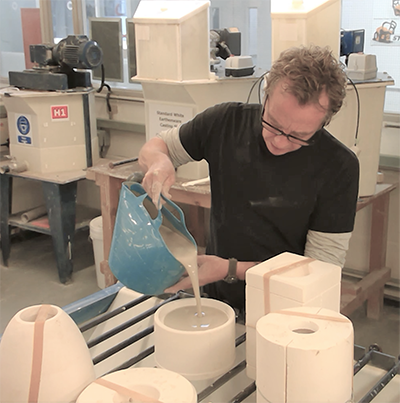
Slip casting into a mould
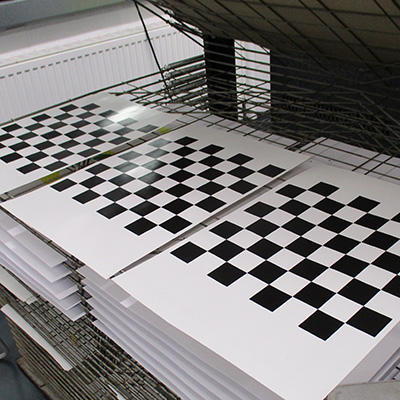
Ceramic transfer screenprints
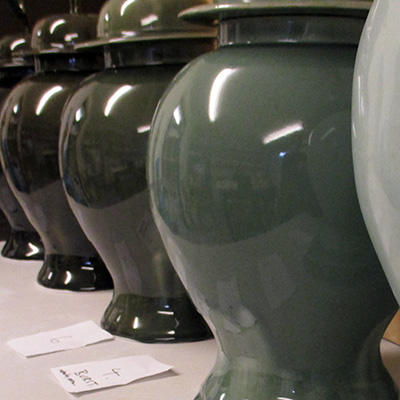
Gas firing reduction glaze
Staff

David Dowler

David Finney
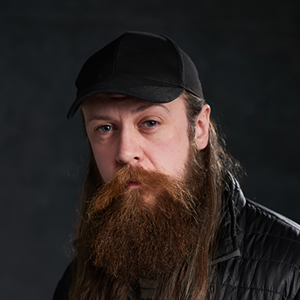
James Brindley
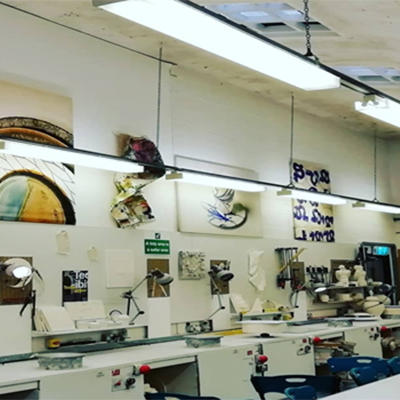
Location
- K001
- K003
- K004
- K005
- K007
- K012
- K014a
- K018 & K018a
- K022
- K0026 & K026a
- Dwight Building
- College Road
- Stoke-on-Trent
- ST4 2DE
Opening Times
Monday to Friday 9-1pm & 2-4.45pm
(Screen printing workshop by appointment)